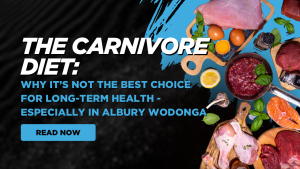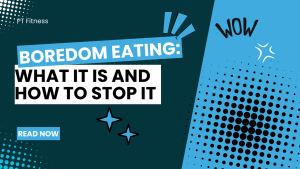The Carnivore Diet: Why It’s Not the Best Choice for Long-Term Health – Especially in Albury Wodonga
If you've been scrolling TikTok or Instagram lately, you’ve likely come across influencers promoting the Carnivore Diet— an all-meat, zero-carb lifestyle that claims to cure everything from bloating to brain fog. But while it might sound appealing to eat steak all day, the reality is a little more… raw.
As personal trainers at PT Fitness Albury Wodonga, we’re often asked about fad diets, and the Carnivore Diet is one of the most controversial. Here’s our expert take on why it’s generally not a sustainable or healthy option — especially if you're serious about fitness, body composition, and long-term health.
? What is the Carnivore Diet?
The Carnivore Diet is a strict eating plan that eliminates all plant-based foods and focuses exclusively on animal products: meat, fish, eggs, and sometimes dairy. That means no fruits, no vegetables, no grains, no legumes — not even herbs or spices in many versions.
While this ultra-low-carb approach may lead to initial weight loss, that doesn’t mean it’s healthy or optimal for performance.
❌ 5 Reasons to Avoid the Carnivore Diet
1. Nutrient Deficiencies Are a Real Risk
Despite what online proponents claim, eating only meat can limit your intake of key micronutrients like:
-
Vitamin C
-
Fiber
-
Magnesium
-
Phytochemicals and antioxidants
These nutrients are essential for immune function, gut health, muscle recovery, and longevity.
2. Gut Health Suffers Without Fiber
The Carnivore Diet is completely void of dietary fiber, which is critical for:
-
Healthy digestion
-
Regular bowel movements
-
Feeding good gut bacteria (your microbiome)
As a personal training team focused on holistic health in Albury Wodonga, we see firsthand how poor gut health can impact training, energy, and mood.
3. It’s Not Sustainable for Most People
Long-term adherence to an all-meat diet is extremely difficult. Social events, family meals, and food variety become a nightmare. This leads to yo-yo dieting, binge eating, and poor relationships with food — something we actively work to improve with our PT clients.
4. Increased Risk of Cardiovascular Disease
While some people may see improved blood sugar levels initially, a high intake of saturated fat and cholesterol from red meat, without balancing fiber and antioxidants, can increase long-term heart disease risk.
5. It Ignores Bio-Individuality
One-size-fits-all doesn’t work in fitness or nutrition. At PT Fitness Albury Wodonga, we tailor meal plans and nutrition advice based on your training goals, health history, and personal preferences. The Carnivore Diet ignores all of that.
⚖️ What’s a Better Alternative?
If you're looking to improve your body composition, energy levels, and gut health, focus on a balanced, whole-foods-based diet:
-
High-quality protein (chicken, fish, lean meats, legumes)
-
Complex carbs (sweet potato, oats, brown rice)
-
Healthy fats (avocado, olive oil, nuts)
-
Plenty of colorful veggies and fiber-rich fruits
Want a tailored plan? Book a nutrition consult with one of our experienced coaches right here at PT Fitness Albury Wodonga.
? Final Thoughts: Choose Sustainable Over Sensational
Diets like the Carnivore Diet thrive on shock value and social media hype, not long-term success or real-world application. While it might promise quick results, it’s often at the expense of your health and sanity.
Instead, build habits that last. Fuel your training. Support your gut. Protect your heart. And trust the coaches who know what works — and what doesn’t — in the real world.
? Looking for expert nutrition coaching in Albury Wodonga? Contact PT Fitness today for a custom approach that works for your goals, body, and lifestyle.
Boredom Eating: What It Is and How to Stop It
If you’ve ever found yourself reaching for snacks even when you’re not hungry—especially while watching TV or procrastinating—it could be boredom eating. It’s one of the most common habits we see in our Wodonga personal training clients, and it can seriously sabotage your fat loss, energy, and health goals.
In this article, we’ll break down what boredom eating is, why it happens, and how clients at PT Fitness Wodonga can take practical steps to stop it.
What is Boredom Eating?
Boredom eating is the habit of eating without physical hunger—usually triggered by emotions like stress, fatigue, or simply having nothing else to do. It’s a behaviour pattern that often flies under the radar but can lead to:
-
Increased calorie intake
-
Difficulty losing weight
-
Disrupted hunger and fullness signals
-
Frustration or guilt after eating
8 Signs You’re Eating Out of Boredom
At PT Fitness Wodonga, we teach our clients to recognise the subtle signs of emotional or boredom eating. Here are some common red flags:
-
You’re not actually hungry.
No hunger pangs, no meal skipped—you just feel like eating. -
You snack while distracted.
Whether it’s scrolling your phone or watching Netflix, you barely notice what you’re eating. -
You turn to food for comfort.
Stress, loneliness, or boredom = snack attack. -
You snack often—even after meals.
You’re constantly reaching for something throughout the day. -
You overeat, especially junk food.
It’s easy to blow past portion sizes, especially with chips, lollies, or baked treats. -
You crave specific foods.
Usually high in sugar, fat, or salt—not a salad. -
You feel guilty after.
You regret eating, especially if it didn’t satisfy you. -
You struggle to stop.
Once you start, it’s hard to walk away—even if you’re full.
Why Boredom Eating Matters for Your Health and Fitness
For clients trying to lose weight in Wodonga, boredom eating is one of the top silent saboteurs. It leads to:
-
Caloric surplus (often without realising it)
-
Low energy due to nutrient-poor foods
-
Plateaued fat loss despite regular training
-
Emotional frustration around eating habits
At PT Fitness Wodonga, our personal training programs are designed to help you stay on track with both movement and mindset—and that includes addressing your nutrition habits.
How to Stop Boredom Eating: Practical Tips from Your Wodonga Coach
Want to break the habit? Here’s what we recommend at PT Fitness:
✅ Use a hunger scale (1–10):
Check in—are you actually hungry, or just triggered?
✅ Have a boredom buster list:
Go for a walk, stretch, drink water, or do a quick task.
✅ Eat mindfully:
No screens, no rushing—just focus on your meal.
✅ Plan balanced meals:
High-protein, high-fibre meals reduce cravings and keep you fuller longer.
✅ Track your patterns:
Use a food diary or app to spot emotional triggers.
Final Word: You’re Not Alone—And We Can Help
Boredom eating is incredibly common, and it’s nothing to feel ashamed about. But it can be changed. If you’re struggling with mindless snacking or emotional eating, we’re here to help.
At PT Fitness Wodonga, our coaching goes beyond the gym floor. We support our clients with personalised training, nutrition advice, and accountability that actually gets results.
? Ready to get back in control of your nutrition?
Book a free consultation with one of our personal trainers in Wodonga today.
Let’s rebuild better habits—together.


